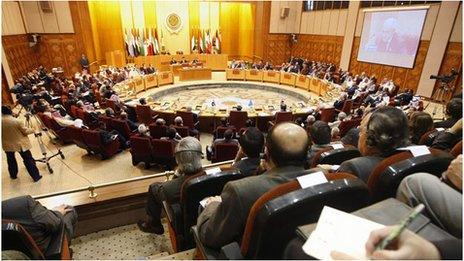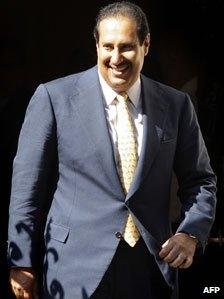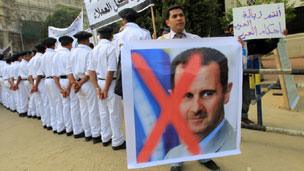How the Arab League embraced revolution
- Published

The Arab League, often seen as a do-nothing organisation, has confounded expectations by changing gears as revolutions sweep the Middle East.
Of all the startling changes that the Arab Spring has brought about, perhaps the most intriguing has been the transformation of the Arab League.
This 22-member organisation, previously seen as a comfortable club for Arab autocrats, has been rocked to its well-appointed and expensive foundations.
With the energetic and, by Arab standards, youthful prime minister of the wealthy gulf state of Qatar playing a leading role, the league let Egypt's Mubarak fall with barely a murmur.
It voted to suspend Gaddafi's Libya in February and watched while the Qataris assisted anti-government forces there. And a crucial vote in March in support of a no-fly zone enabled Nato to play a decisive role in swinging the war to the rebel side.
And then most unexpectedly of all, the Arab League took a hard stance against the Syrian regime of Bashar al-Assad.
In August, the league condemned the Syrian government for its repression of nationwide uprisings and called for an immediate end to the violence.
Then in November it suspended Syria for failing to stick to a deal that included halting military action and starting talks with the opposition.
And when Syria continued to prevaricate, the league slapped sanctions on the regime.
In all its previously unremarkable 66-year history, nothing quite like what has happened in the past few months has ever before occurred.
It's as if a gentleman's club, very wealthy, very smug and sure of itself, had suddenly been forced to drink deep from the revolutionary's cup and found it rather intoxicating.
So how did it all come about?

The Arab League was an organisation established in Cairo in 1945 primarily to be a counterweight to the looming and soon to be realised state of Israel.
Through the decades since, the league's efforts to establish itself as a significant political force have been lacklustre at best.
Egypt's influence in the league waned as the power and financial clout of the gulf states, especially Saudi Arabia, grew.
Although the league has a military protocol, and various members have waged wars on Israel over the years, its only previous joint exercise was, ironically, to join Syrian troops in Lebanon from 1976 to 1983.
Countless summits have come and gone while the Arab League slumbered on, apparently unconcerned about human rights abuses, rampant poverty and unemployment, and the frequently brutal suppression of pro-democracy activists among its members.

Qatari PM Al Thani is known as 'peacemaker'
Then came the Arab spring.
As dictators fell one by one, the league began to wake up. Angry young Arabs were shouting and the risks of appearing not to listen were all too readily apparent.
Ignoring the Arab Spring was not an option. The alternative, to support the push for freedom, was scarcely more palatable for this league of autocrats. But influential players like Saudi Arabia's King Abdullah knew something had to give.
Facing pressures from western allies, and worried that their own populations were enthusiastically taking up the Syrian opposition cause on social media sites, the more energetic members of the club sat up and took notice.
None more so than Sheikh Hamad bin Jassim bin Jaber Al Thani, the 52-year-old prime minister and foreign minister of Qatar.
One of the world's wealthiest men, he's earned the nickname "peacemaker" for his efforts over the years to broker reconciliations between warring factions in Africa and the Middle East.
Middle East observers see him as tough, bright and very much up to speed with what is happening in the region.
He grasped earlier than his colleagues that the league could not ignore the killing of unarmed civilians in Syria. And he pushed hard to suspend the country and impose sanctions against the embattled regime of President Bashar al-Assad.
Ever the pragmatist though, Jaber Al Thani had shown no public concern for the violence and killing of protesters in February and March in Qatar's next-door gulf neighbour Bahrain. The Bahrainis were happy to return the favour by voting for sanctions against Syria.
Riyadh-based Saudi analyst Mohsen Al Awaji says "without the personality of that man, the message would not have been delivered. His was the strong hand behind the process."
Others see the Qatari initiative as further proof that Saudi Arabia is out of touch and slow to move in fast changing circumstances.
"Compared to the Saudi royals, the Qataris are in overdrive, they are hyperactive," says Middle East expert Peter Harling of the think tank International Crisis Group.
Harling argues that Qatari foreign policy is decided by a tight group - the emir, the prime minister and a few key advisors.
"Their style," he adds "fits the era. It's a golden opportunity for them to stake a claim"
The Turkish factor
Something else that may have forced the hand of the Arab League is non-member Turkey.
In recent weeks, Syria's northern neighbour has been unequivocal in its condemnation of Bashir al Assad. And Turkey has provided sanctuary for defecting soldiers of the Syrian Free Army.

Protesters supported the Arab League's condemnation of Syria
In the emerging game of chess that the tussle for regional supremacy has become, those moves threatened to leave the Arab League and arguably its most powerful member Saudi Arabia looking, once again, out of touch and out of step.
So in the wake of Turkish Prime Minister Erdogan's late November call for Assad to step down, the league was quick to follow through on its threat to impose sanctions.
On Thursday, Turkey responded with another move, placing trade sanctions on Syria that will further isolate the regime and cost the country an estimated £1.6bn.
The Arab League's decision to impose their sanctions may well have been at the behest of the Saudis. According to Mohsen Al Awaji, "they (the Qataris) could not have proceeded without the authority of the House of Saud".
Others are not so sure. Jane Kinninmont, a Middle East specialist with London's Chatham House, points to the enormous oil and gas wealth of the Qataris.
"They can do without a Saudi say so. Qatar doesn't depend on them economically."
And she notes that the two countries have argued in the past, with Qatar often charting a different course.
Peter Harling says that with the Arab Spring, the Qataris are using the league to "punch well above their weight". Power and influence, he argues, are shifting at a speed that the leadership in the House of Saud are uncomfortable with.
What next?
The question for the Qataris, the Saudis and the rest of the Arab League is what to do next. The Syrian opposition is calling for a no-fly zone. There is even talk of troops on the ground.
But given the crucial position of Syria - it borders on Iraq, Lebanon, Jordan, Turkey and Israel - any thought of military intervention brings with it serious risk and consequence.
So sanctions seem the safest and best option for the time being.
The trouble with sanctions? They won't hit the regime or the Assad family - reported to have stashed billions - particularly hard. But they will hurt the people of Syria.
The country is heading into a hard winter of continued protest and violence. Food and fuel costs are fast escalating. The economy is stagnant. The middle classes, even in the wealthy northern city of Aleppo, are feeling a squeeze that will only worsen now that the Turks have also imposed sanctions.
With defections increasing from the rank and file of the army, the threat of civil war continues to rise.
For that stark outcome to be avoided, someone must negotiate an exit strategy for Mr Assad. It could be the Turks or indeed the House of Saud.
"This is a film where no one knows who the real producer is," says Mohsen Al Awaji.
But the smart money says that if there is to be a solution, it will be Jabr al Thani "the peacemaker" of the Arab League, who will negotiate the final deal.
- Published30 November 2011
- Published30 November 2011
- Published30 November 2011